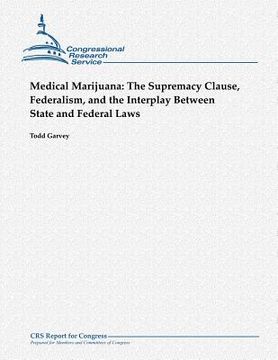Medical Marijuana: The Supremacy Clause, Federalism, and the Interplay Between State and Federal Laws (in English)
Synopsis "Medical Marijuana: The Supremacy Clause, Federalism, and the Interplay Between State and Federal Laws (in English)"
As part of a larger scheme to regulate drugs and other controlled substances, federal law prohibits the cultivation, distribution, and possession of marijuana. No exception is made for marijuana used in the course of a recommended medical treatment. Indeed, by categorizing marijuana as a Schedule I drug under the Controlled Substances Act (CSA), the federal government has concluded that marijuana has "no currently accepted medical use in treatment in the United States." Yet 18 states and the District of Columbia have decriminalized medical marijuana by enacting exceptions to their state drug laws that permit individuals to grow, possess, or use marijuana for medicinal purposes. In contrast to the complete federal prohibition, these 19 jurisdictions see medicinal value in marijuana and permit the drug's use under certain circumstances. Although the U.S. Supreme Court has established Congress's constitutional authority to enact the existing federal prohibition on marijuana, principles of federalism prevent the federal government from mandating that the states actively support or participate in enforcing the federal law. While state resources may be helpful in combating the illegal use of marijuana, Congress's ability to compel the states to enact similar criminal prohibitions, to repeal medical marijuana exemptions, or to direct state police officers to enforce the federal law remains limited by the Tenth Amendment. Even if the federal government is prohibited from mandating that the states adopt laws supportive of federal policy, the constitutional doctrine of preemption generally prevents states from enacting laws that are inconsistent with federal law. Under the Supremacy Clause, state laws that conflict with federal law are generally preempted and therefore void. Courts, however, have not viewed the relationship between state and federal marijuana laws in such a manner, nor did Congress intend that the CSA displace all state laws associated with controlled substances. Instead, the relationship between the federal ban on marijuana and state medical marijuana exemptions must be considered in the context of two distinct sovereigns, each enacting separate and independent criminal regimes with separate and independent enforcement mechanisms, in which certain conduct may be prohibited under one sovereign and not the other. Although state and federal marijuana laws may be "logically inconsistent," a decision not to criminalize-or even to expressly decriminalize-conduct for purposes of the law within one sphere does nothing to alter the legality of that same conduct in the other sphere. This report will review the federal government's constitutional authority to enact the federal criminal prohibition on marijuana; highlight certain principles of federalism that prevent the federal government from mandating that states participate in enforcing the federal prohibition; consider unresolved questions relating to the extent to which state authorization and regulation of medical marijuana are preempted by federal law; and assess what obligations, if any, the U.S. Department of Justice (DOJ) has to investigate and prosecute violations of the federal prohibition on marijuana.

